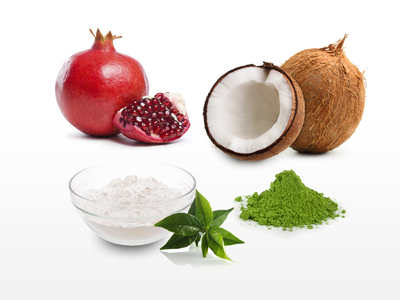Contents
Summary
Many people like to use non-peroxide or more natural whitening agents. These agents provide stain-lightening and prevention without the sensitivity that may come with peroxide-based formulas.
Description
Natural teeth whitening methods can be in the form of rinses, toothpastes and other methods, but instead of peroxide, these products use ingredients like baking soda, table salt, vinegar, pomegranate seed extract, silica (sand-like abrasive), crushed bamboo, and citric acid (found in lemon, grapefruit and orange oil) to whiten and brighten. Some of them you can make yourself at home, others are available to purchase.
 Baking soda
Baking soda
Baking soda (sodium bicarbonate) is well known for its cleansing properties and has found many uses around the house. It’s also found its way into oral health and teeth cleaning. Baking soda has the advantage of being an very gentle abrasive (gentler than most commercial whitening toothpastes). The purpose of the baking soda is to polish away the protein pellicle that settles on teeth and collects stains while protecting enamel from the acidic things we consume or expose our mouths to.
On its own, baking soda also helps keep the acidity level down in the mouth which helps keep cavities from forming by starving the bacteria that would cause them which thrive in an acidic environment.
Oil Pulling
Oil pulling has been around for a long time too as a way to naturally clean and detox gums and teeth. Oil cuts through plaque and safely removes toxins. The key to effective oil pulling is a good quality oil. The technique involves swishing a teaspoon or two of coconut, sesame or olive oil around in the mouth and pulling the oil between teeth with movement of the tongue and cheeks.
Activated charcoal
Activated charcoal is probably most well-known for its ability to absorb toxins particularly in the cases of food poisoning or ingestion of poisons and certain spider venoms. Brushed gently onto teeth, it absorbs stains but does not tend to stick to the enamel. When the activated charcoal is rinsed away with a few swishes of water, it leaves teeth clean and white.
Citric Acid
Citric acid is the acid found in grapefruit, lemons and oranges. One natural remedy people are discovering is rubbing the white side of a grapefruit, lemon or orange on teeth to whiten. Citric acid works similarly to peroxide in that it temporarily weakens enamel and allows the acidto brighten the stains.
Others
Table salt, crushed bamboo, and silica all act as polishers and gentle abrasives to safely clean away stains. Table salt can be sprinkled on normal toothpaste or added to baking soda. Crushed bamboo is a common non-peroxide whitening ingredient added to natural toothpastes and gels, as is silica.
Results
Without the stronger bleaching ingredients, results from natural remedies aren’t as drastic as with conventional whitening products. Some users of the oil pulling method or baking soda have seen two or three shades’ difference. It’s reasonable to expect results to appear more gradually over a week or two.
Pros and Cons
Of course, the advantage of natural ingredients is that they won’t burn gums and other soft tissue in the mouth like peroxides can. There are also fewer incidents or at least decreased severity of sensitivity symptoms associated with whitening ingredients. Plus, many users like the idea of simply using naturally-derived products, even if it means using it more or waiting longer to see results.
Moreover, most people already have some of these products in their cupboards and so whitening is not only convenient, but doesn’t cost anything extra.
Tips and Guidelines for Use
- Natural methods overuse. People tend to believe the natural whitening methods can be used continuously without restriction. But, if they are overused, even gentle abrasives can harm enamel or soft tissues. It is not recommended to use them more than you would use regular whitening methods.
- Citric acid too hard on teeth? There is some debate over the effect of citric acid on the teeth since it binds calcium which is one of the main minerals of tooth enamel. Of all the natural remedies, this one is probably the least favored since baking soda and crushed bamboo products are much easier on enamel.
